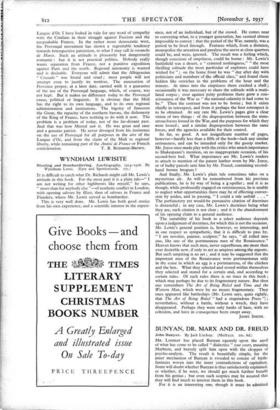WYNDHAM LEWISITE
IT is difficult to catch what Dr. Richards might call Mr. Lewis's attitude in this book. For the most part it is a plain tale—" I am not writing for other highbrows like myself," he says, " more than for anybody else "—of aesthetic conflict in London, with opening salvoes by Blast, then of salvoes in France and Flanders, where Mr. Lewis served as bombardier.
This is very well done. Mr. Lewis has both good stories from his own experience, and a scientific interest in the experi- ence, not of an individual, but of the crowd. He comes near to conveying whar, to a younger generation; has seemed almost impossible to convey : that the period of the War, namely, was a period to be lived through. Features which, from a distance, monopolise the attention and paralyse the nerve at close quarters could be, and were, ignored. The result was a feeling which, though conscious of emptiness, could be borne : Mr. Lewis's battlefield was a desert, a " cratered nothingness," " the most thrilling solitude the most particular of explorers could have wished for " ; on the home front he was " day after day with politicians and members of the official class," and found them hidden like ostriches in the problems of the hour and the minute. At times into the emptiness there crashed a shell ; occasionally it was necessary to share the solitude with a muti- lated corpse ; over against petty problems there grew a con• sciousness of the War as " the national calamity it had come to be." Then the contrast was not to be borne ; but it exists chiefly in retrospect, and from it perhaps the best retrospect is to be obtained. At any rate Mr. Lewis's pages give a clear vision of two things : of the disproportion between the mon- strous forces loosed in the War, and the purposes for which they were loosed ; and a similar disproportion between the same forces, and the agencies available for their control.
So far, so good. A not insignificant number of pages, however—hardly less than a fifth of the book—lack any similar seriousness, and can be intended only for the gossip market. Mr. Joyce once made play with the critics who attach importance to Shakespeare's mention, on no inappropriate occasion, of his second-best bed. What importance are Mr. Lewis's readers to attach to mention of the patent leather worn by Mr. Joyce, or of bulky-parcels sent him by Mr. Pound, containing second- hand brown brogues ?
And finally, Mr. Lewis's plain tale sometimes takes on a mysterious air. As will be remembered from his previous publications, he is by way of being a g )speller ; and it is • as though, while professedly engaged on reminiscence, he is unable to neglect what opportunities there may be of effecting conver- sion by asides, and in passing, " I could a tale unfold . . . " The perfunctory yet would-be persuasive citation of doctrines is distasteful ; in any case, Mr. Lewis's doctrines being what they are, such citation is not clear ; and it is the abandonment of his opening claim to a general audience.
The suitability of his book to a select audience depends upon a judgement of doctrines, for which this is not the occasion. Mr. Lewis's general position is, however, so interesting, and in one respect so sympathetic, that it is difficult to pass by. " I am novelist, painter, sculptor," he says, " all rolled into one, like one of the portmanteau men of the Renaissance." Heaven knows that such men, never superfluouss ate more than ever desirable now, if only to act as umpires amongithe experts. But such umpiring is an art ; and it may be suggested that the important men of the Renaissance were portmanteaux only in the sense in which an egg is a portmanteau, of the chicken and the hen. What they selected and stored within themselves they selected and stored for a certain end, and according to certain rules. Of such rules there is no trace in this book ; which may perhaps be due to its fragmentary nature. But then one remembers The Art of Being Ruled and Time and the Western Man, which were by no means fragmentary. They once appeared like battleships (Mr. Lewis says, quite rightly, that The Art of Being Ruled " had a stupendous Press ") ; nevertheless, without a battle, without a wreck, they have disappeared. Perhaps they were only banks of haze, with no cohesion, and have in consequence been swept away.
JAMES SMITH.














































 Previous page
Previous page